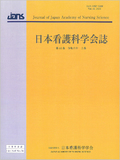Japanese
English
- 販売していません
- Abstract 文献概要
- 参考文献 Reference
要旨
目的:非アルコール性脂肪性肝疾患(以下,NAFLD)患者のヘルスリテラシー(以下,HL),セルフケア,セルフケア能力に関する実態を調査した.
方法:自立し受診している30歳〜65歳未満のNAFLD患者に無記名自記式質問紙調査を行った.HL,セルフケア能力と基本属性・特性についてt検定,一元配置分散分析,さらに,HL,セルフケア,セルフケア能力の相関を明らかにした.
結果:分析対象者204名,有効回答率16.2%であった.HLは,就業,学歴,BMI,食事・運動指導を受けた経験の有無に,セルフケア能力は,性別,就業,学歴,食事・運動指導を受けた経験の有無による差がみられた.HLはセルフケア,セルフケア能力との間に弱い相関がみられた.
結論:NAFLD患者へのセルフケア継続には,患者の属性・特性を捉え,セルフケアについて具体的な方法の提案が,効果的な支援になることが示唆された.
Aim: This study investigated the actual situation of the lives of patients with non-alcoholic fatty liver disease, including their health literacy, self-care, and self-care abilities.
Methods: An anonymous self-administered questionnaire was distributed to independent and socially active patients aged 30-65 years with non-alcoholic fatty liver disease during their medical visits. T-tests and one-way analysis of variance were conducted to explore the differences in health literacy and self-care ability based on basic attributes and characteristics. Furthermore, correlations between health literacy, self-care, self-care ability, as well as between self-care and self-care ability, were identified.
Results: This study included 204 participants, with a valid response rate of 16.2%. Health literacy among patients with non-alcoholic fatty liver disease differed according to employment, educational status, body mass index, prior diet, and exercise training. Self-care ability differed according to sex, employment status, educational status, prior diet, and exercise training. Health literacy was weakly correlated with self-care and self-care ability.
Conclusions: Capturing the attributes and characteristics of patients with non-alcoholic fatty liver disease and suggesting specific self-care methods could effectively support the continuation of self-care for patients with non-alcoholic fatty liver disease.
Copyright © 2024, Japan Academy of Nursing Science. All rights reserved.


